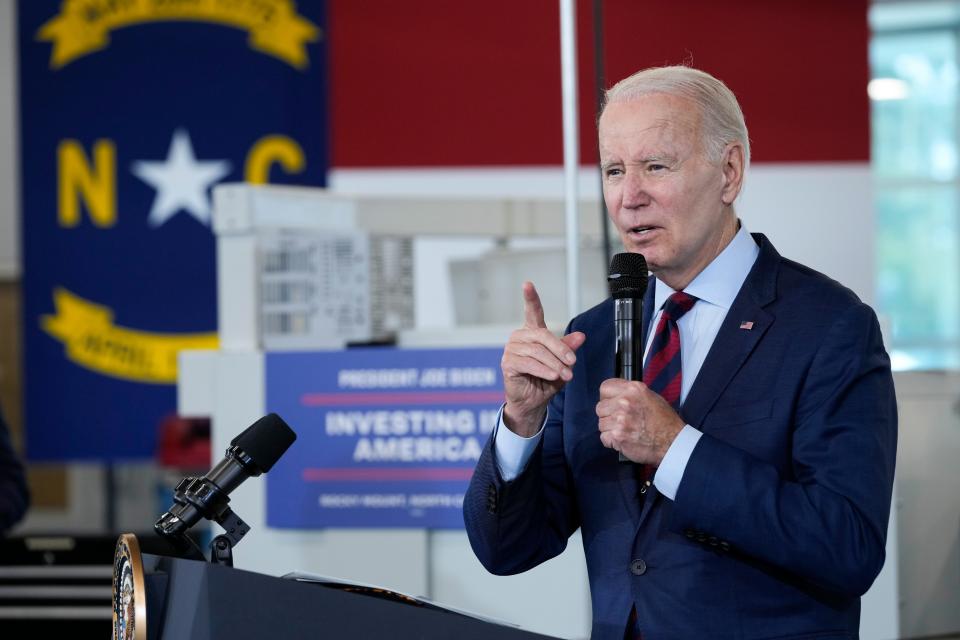The next Georgia? Biden campaign targets North Carolina to reshape 2024 electoral map
- Oops!Something went wrong.Please try again later.
- Oops!Something went wrong.Please try again later.
- Oops!Something went wrong.Please try again later.
WASHINGTON −Stephanie Jabusch, a retired computer programmer from Cary, North Carolina, already planned to vote for Joe Biden in 2024, just like she did in 2020.
Then Republicans in the North Carolina state legislature handed her extra motivation last month when they overturned a veto from the state's Democratic governor, Roy Cooper, to pass a 12-week abortion ban.
"I've got two daughters," said Jabusch, 60, a registered Democrat. "It scares me that if they get in trouble with a normal pregnancy, they could die just because they're not given proper health care."
Biden's reelection campaign is targeting North Carolina as a top state to try to flip in 2024, with Democrats convinced that the Tar Heel state's booming suburbs with college-educated voters around Charlotte and Raleigh's "Research Triangle," combined with its sizable Black population, make it prime for a Democratic pickup.
It's a similar formula that turned once-reliably red Georgia to the Democratic column in 2020, and it makes North Carolina and its 16 electoral votes perhaps the best shot for Biden to reshape the electoral map by carrying a state he lost in 2020.
The Biden campaign is already running television ads in the state. And in a sign of North Carolina's battleground status in 2024, former President Donald Trump, Florida Gov. Ron DeSantis, Mike Pence and other Republican presidential contenders converged Saturday on Greensboro, North Carolina for the state's Republican Party convention. Their appearances came one day after Biden visited the state.
"There's no question he can win North Carolina," Cooper said of Biden in an interview with USA TODAY, calling the abortion override a "flashpoint" for many North Carolinians. "A strong majority of people in North Carolina do not want restrictive bans on abortion."
Biden lost North Carolina by just 1.3 percentage points in 2020, the smallest margin of all the states he lost. It was Democrats' best presidential performance in North Carolina since former President Barack Obama carried the state by less than 1 point in 2008. And Biden has a strong ally in Cooper, North Carolina's most popular Democratic officeholder in recent political history as he wraps up his second term next year.
Democrats believe the state's new abortion law will help galvanize their base, including women and young voters in the way that the Supreme Court's overturning of Roe v. Wade last year helped carry Democrats nationally in the 2022 midterms.
North Carolina's law bans abortions after 12 weeks with exceptions for rape, incest, fetal anomalies and cases in which the life of the pregnant person is at risk. A poll from Meredith College found that 57% of North Carolinians supported either keeping the state's previous law, which restricted abortions after 20 weeks, or expanding abortion services.

North Carolina Democrats, after a string of setbacks, still see an uphill fight
Yet for all the reasons Democrats feel encouraged by their chances in North Carolina, they also see signs of another letdown.
Both of North Carolina's state legislative chambers have turned into Republican supermajorities. Republicans took control of the state Supreme Court last year. No Democratic statewide candidate running for a federal office has won in North Carolina since Obama in 2008.
Republican Sen. Thom Tillis, R-N.C., defeated Democrat Cal Cunningham in 2020 by 2 percentage points, while Trump-backed Ted Budd beat Democrat Cheri Beasley by a wider 3 percentage points in the state's 2022 Senate race. Beasley's close loss led to second-guessing among the left about the Senate Democrats' campaign arm's decision not to pump significant resources into the contest.
Meanwhile, North Carolina has become fertile ground for conservative battles on abortion, sexuality and gender identity, and teaching about race in public classrooms.
"It's probably going to be uphill to do that," Jabusch said of turning North Carolina blue for Biden. "There's a lot of Republicans who vote here and the Democrats don't seem to always get everybody out to the polls." She added: "Sometimes I wonder why I'm still living in North Carolina."
Biden on Friday visited a community college in Rocky Mount, North Carolina − a city of about 50,000 in northeast North Carolina that he narrowly won in 2020 − to tout his administration's "Investing in America" plan to reinvigorate U.S. manufacturing and historic infrastructure law.
"A manufacturing and innovation boom is happening all across America, not just in North Carolina," Biden said before traveling to Fort Liberty, North Carolina, formerly Fort Bragg, to visit with service members.
It marked Biden's sixth trip to the state as president. He appeared with Cooper in a pairing that the Biden campaign will rely on repeatedly in the campaign ahead. While Biden fell 74,000 votes short in North Carolina in 2020, Cooper carried the state in his reelection bid by 4.5 percentage points, 248,000 votes.

Although Cooper is term-limited from running again in 2024, the ballot will include a high-profile open governor's race. Most political analysts expect a contest between Josh Stein, North Carolina's Democratic attorney general elected in 2020, and Mark Robinson, a firebrand Republican lieutenant governor who has a trail of controversial statements about homosexuality, guns and abortion.
North Carolina Democrats believe a Robinson nomination for Republicans can work to Stein's and Biden's advantage, particularly in a potential rematch against Trump, by reinforcing their attacks against an "extreme MAGA" agenda.
"The Republican (gubernatorial) candidate is most likely going to be an extreme MAGA candidate who believes that all abortion should be banned," said Cooper, who serves on the Biden campaign's national advisory board. "And I believe that in North Carolina, you're going to see a lot of the electorate stirred up about that race − and we know that we'll get the MAGA candidate himself, Donald Trump, or someone in that vein."
Is fast-growing North Carolina nearing a political 'tipping point?'
A Biden win in North Carolina could open a new path to secure the 270 electoral votes needed to win the presidency if the president doesn't repeat a trifecta of victories in three Midwest battlegrounds, Pennsylvania, Michigan and Wisconsin. Biden carried each narrowly in 2020 after Trump won all three in 2016.
A loss in North Carolina for Republicans would severely hinder their nominee's chances.
The Biden campaign targeted North Carolina in its first set of television ads, a seven-figure buy last month, along with five other battleground states that Biden won in 2020 as well as Florida, the other state the Biden campaign has circled as a possible pick-up.
“We are excited the Biden campaign is investing in North Carolina," said Emma Vaughn, national press secretary for the Republican National Committee, "as Republicans always encourage Democrats to light money on fire in places where voters have solidly rejected them cycle after cycle."
Democrats' optimism about North Carolina is largely due to the rapid growth of Charlotte and the Research Triangle, anchored by Raleigh and Durham and home to universities such as the University of North Carolina-Chapel Hill, North Carolina State University and Duke University. Like other parts of the country, the state's suburbs have shifted more Democratic in the era of Trump.
Morgan Jackson, a Democratic consultant for Cooper and Stein, compared North Carolina's growth centers to the exploding Atlanta metro area in Georgia, Phoenix suburbs in Arizona and suburbs in Northern Virginia that propelled those states to shift from Republican strongholds to recent Democratic wins. Biden won all three states in 2020.
"There's a tipping point where they just outvote the rest of the state, and North Carolina is headed that way," Jackson said.
Republicans betting on 'diminishing returns' in North Carolina, GOP consultant warns
Biden's narrow 2020 loss in North Carolina, Jackson noted, came despite a massive voter turnout among Trump's core supporters: 81% of registered Republicans and 79% of white voters went to the polls, and there was historic turnout among rural voters and white voters without college degrees.
"The electorate actually happened to be in 2020 more favorable to Republicans than it was in 2016 and Donald Trump did two points worse than in 2016," Jackson said. "And that's all driven by demographic shift, by urbanization. North Carolina continues to head that way."
Yet Republicans have made up significant ground in North Carolina voter registration, forcing Democrats to rely increasingly on unaffiliated independent voters to win elections.
North Carolina added about 760,000 new registered voters between 2012 and 2022. Although Democrats maintain a small edge in registered voters, Democrats experienced a net loss of 360,000 registered voters in the state over that period, compared to a net gain of 170,000 for Republicans. Leading the growth has been an explosion of 930,000 voters not registered with either major party.
"I will definitely not be voting for Biden," said Mark Stevens, 50, a computer technician in Kernersville, North Carolina, who votes Republican. "Everything he seems to be doing seems to be increasing the size, power and scope of government without increasing any effectiveness."
The concern, however, for North Carolina Republicans: The bulk of new unaffiliated voters are in Democratic-heavy Mecklenburg County (Charlotte) and Wake County (Raleigh), which collectively gained more voters over the past 10 years than 88 other North Carolina counties combined, consisting of mostly rural areas that make up the Republican base.
North Carolina's 12 other counties, including Mecklenburg, Wake and other suburban and urban counties, accounted for 75% of voter registration growth over the past decade, according to Paul Shumaker, a Republican consultant in North Carolina who has worked for Tillis, among others.
"Republicans are going to be betting their success on diminishing returns," Shumaker said. "And Democrats are going to be betting their success on the suburbanization, urbanization and growth of those 12 counties."
Shumaker said the key voting bloc will be unaffiliated women voters. He predicted Democrats will look to "radicalize" Republicans over the abortion issue to get women voters, but he argued the state's voters are actually "more in line" with the new 12-month ban passed by Republicans.
"The Democrats want full-term, unlimited, unrestricted access at any time," Shumaker said. "That's not what a majority of voters are."
If the Republican base turns out in North Carolina the way it did for Trump in 2020, Shumaker said Republicans should still carry the state in 2024, albeit by a smaller 20,000 votes. But if turnout dips among rural, white non-college educated voters, he said Biden will win.
And that would potentially be a crushing blow to the Republican ticket.
"They cannot win the White House without winning North Carolina," Shumaker said of the GOP. "That's the national map."
Contributing: Associated Press. Reach Joey Garrison on Twitter @joeygarrison.
This article originally appeared on USA TODAY: Biden campaign eyes North Carolina to reshape 2024 electoral map

